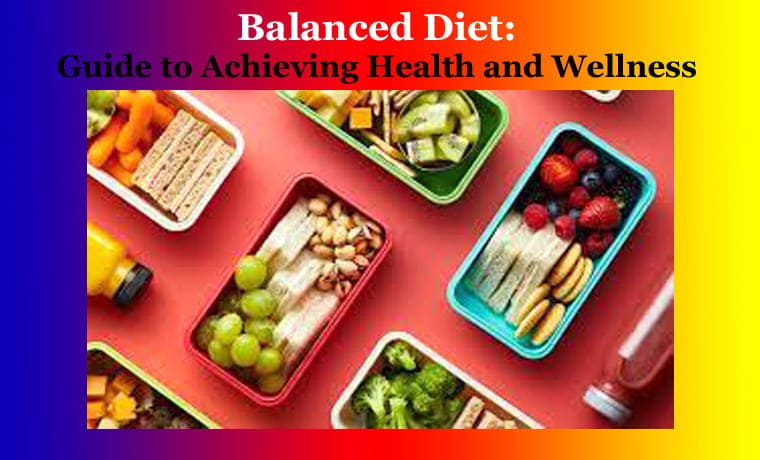Discover the key to optimal health and wellness with a balanced diet. Learn how to incorporate a variety of nutrient-rich foods into your daily routine for improved energy, weight management, and reduced risk of chronic disease.”
Balanced Diet: Complete Guide to Achieving Health and Wellness
Introduction:
In today’s fast-paced world, maintaining a healthy lifestyle can feel like an uphill battle. With so much conflicting information about nutrition and dietary trends, it’s easy to feel overwhelmed and unsure of where to start. However, one timeless principle remains at the core of optimal health and wellness: a balanced diet. In this comprehensive guide, we will explore the concept of a balanced diet, its importance for overall health, and practical strategies for incorporating it into your daily life.
Understanding a Balanced Diet:
A balanced diet is more than just counting calories or restricting certain food groups. It is about nourishing your body with a variety of nutrient-rich foods in appropriate proportions. A balanced diet includes:
Fruits and vegetables: Rich in vitamins, minerals, antioxidants, and fiber, fruits and vegetables are essential for overall health and disease prevention.
Whole grains: Whole grains provide complex carbohydrates, fiber, and essential nutrients such as B vitamins and iron. Examples include brown rice, quinoa, oats, and whole wheat bread.
Lean proteins: Protein is vital for muscle repair, immune function, and satiety. Opt for lean sources such as poultry, fish, beans, lentils, tofu, and low-fat dairy.
Healthy fats: Unsaturated fats, found in foods like avocados, nuts, seeds, and olive oil, are important for heart health, brain function, and nutrient absorption.
The Benefits of a Balanced Diet:
Weight management: A balanced diet helps regulate appetite, prevent overeating, and support weight loss or maintenance goals.
Improved energy levels: Nutrient-dense foods provide sustained energy throughout the day, reducing fatigue and boosting productivity.
Enhanced mood and mental clarity: Proper nutrition supports brain health and neurotransmitter function, leading to improved mood, focus, and cognitive function.
Reduced risk of chronic diseases: A balanced diet lowers the risk of heart disease, diabetes, obesity, and certain cancers by providing essential nutrients and reducing inflammation in the body.
Stronger immune system: Nutrient-rich foods support immune function, helping the body fight off infections and illnesses more effectively.
Practical Tips for Achieving a Balanced Diet:
Plan your meals: Take time to plan balanced meals and snacks ahead of time, incorporating a variety of foods from all food groups.
Shop smart: Fill your grocery cart with fresh produce, whole grains, lean proteins, and healthy fats, and limit processed and packaged foods high in added sugars, unhealthy fats, and sodium.
Cook at home: Prepare homemade meals whenever possible, using whole, minimally processed ingredients and limiting added sugars, salt, and unhealthy fats.
Practice portion control: Be mindful of portion sizes and avoid oversized servings by using smaller plates, bowls, and utensils.
Stay hydrated: Drink plenty of water throughout the day to stay hydrated and support digestion, metabolism, and overall health.
Be flexible: Allow yourself flexibility in your eating patterns, and enjoy occasional treats or indulgences in moderation without guilt or restriction.
Conclusion:
A balanced diet is the foundation of a healthy lifestyle, providing the essential nutrients our bodies need for optimal function and well-being. By understanding the components of a balanced diet and implementing practical strategies for incorporating it into your daily routine, you can reap the numerous benefits it offers, including improved health, sustained energy, and reduced risk of chronic disease. Embrace the diversity and abundance of whole, nutrient-dense foods available to you, and nourish your body for a lifetime of vitality and wellness. 0 0 0.
You May Like:











